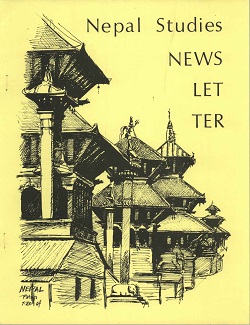Author Biography
Sanjog Rupakheti (PhD, Rutgers University, 2012) is an Assistant Professor of History at Loyola University New Orleans. His research interests broadly span state making, modernity, law, and histories of caste, gender, and labor relations in South Asia. Sanjog is currently completing a book manuscript tentatively titled “Making of a Himalayan Kingdom: Caste, Genealogy and Law in Nepal” that charts a socio-political history of the creation and survival of the Nepali state in the shadow of the growing British Empire.
Abstract
Since the mid-eighteenth century when armies serving the English East India Company (EIC) clashed with the Gorkhali power, British officers depicted Nepal as an example of classical Hindu despotism. Subsequent scholars of the region have not challenged these representations, taking such colonial descriptors as ‘facts.’ The portrayal of the centralized and ‘despotic’ state in South Asian pasts rests upon a certain understanding of the state’s relationship with society. It calls for imagining the Gorkhali regime as alien to the rest of society and supposing that ethnicity and caste are inflexible from one century to the next. The excessive attention given to land systems and revenue extraction to understand the early Gorkhali state formation has equally left us with a limited narrative that is conspicuous for its absence of non-fiscal elements of state making. The frequency and volume of state-society interactions as gleaned from the documents of the period however belie static depiction of power and rule in nineteenth century Nepal. This essay, building on previously unstudied sources, replaces the picture of a static ‘Hindu’despotic state with one that responded to its entanglement with internal and external forces, and put together, piece by piece, a Hindu polity out of a plural society along the Himalayan foothills. The resulting order was processual not a homeostatic structure. Gorkhali rulers succeeded in projecting their power through intertwined strategies of literary and religious patronage, code promulgation, and political manipulation of ritual and rank. The early nineteenth century Gorkhali state like other pre-colonial polities in South Asia was simultaneously coercive and consensual, extractive and re-distributive.
Acknowledgements
I acknowledge with gratitude the support and guidance of Sumit Guha and Indrani Chatterjee on the larger research project, from which this article is drawn. For their careful and insightful suggestions on the earlier drafts, I thank Ashley Howard, Paul Buehler, and the two anonymous reviewers of Himalaya. I am especially grateful to Catherine Warner and Arik Moran (editors of this special issue), for their meticulous work on the earlier drafts. Any remaining mistakes and omissions are entirely my own.
Creative Commons License

This work is licensed under a Creative Commons Attribution 4.0 License.
Recommended Citation
Rupakheti, Sanjog. 2016. Reconsidering State-Society Relations in South Asia: A Himalayan Case Study. HIMALAYA 35(2).
Available at:
https://digitalcommons.macalester.edu/himalaya/vol35/iss2/11


